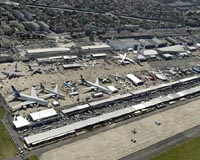| . |  |
. |
Tripoli, Lebanon (UPI) Jun 17, 2009 The reported return of a veteran Palestinian bomb maker to his old stomping grounds in the port city of Tripoli in north Lebanon is ringing alarm bells because there are fears that he will link up with a jihadist group that is reforming after being battered by the Lebanese army two years ago. Officials at the U.S. Federal Bureau of Investigation reported in late May that Hussein al-Umari, aka Abu Ibrahim, was believed to have slipped out of Iraq, where he had lived for many years under Saddam Hussein's protection, and into Lebanon via Syria in the recent past. Umari, 73, is suspected of having used his bomb-making skills to aid Iraqi insurgents. CIA sources said he has returned to his birthplace, Tripoli, Lebanon's second-largest city, and has connections in Palestinian refugee camps in north Lebanon. His second wife, Selma, is also from Tripoli. In the 1980s Umari headed a Palestinian group known as May 15, after the date in 1948 when the state of Israel was proclaimed. It specialized in bombing aircraft. Lebanese authorities haven't been able to confirm that Umari is back in Tripoli, but the report of his return was unsettling because of signs that jihadists linked to al-Qaida are reforming after a series of setbacks in Lebanon. Analysts and intelligence operatives agree that al-Qaida has been increasingly focused on establishing cells in Lebanon and the Levant in a systematic expansion into the region from Iraq, in which after 2003 it was able to establish a major base in the region that it never had before. The big concern is that al-Qaida may switch the center of its regional operations from Iraq to the Levant, with Israel the main target. Tripoli is a center of jihadist activity headed by a group called Fatal al-Islam, an Islamist offshoot of a radical, Syrian-backed Palestinian group known as Fatah-Intifada that fought a 106-day war against the Lebanese army in the city's Nahr al-Bared refugee camp in May-September 2007. Some 500 people were killed, including 160 soldiers, before the jihadists were crushed. The group's leader, Shakir al-Absi, escaped and is reported to be in prison in Syria. A series of attacks over the last couple of years have been widely blamed on Fatah al-Islam or its fellow travelers. The Lebanese army has been particularly targeted. Gen. Francois el-Hajj, who led the Nahr al-Bared campaign and was tipped to be promoted to army commander, was assassinated on Dec. 12, 2007. His killing was seen as a reprisal for Nahr al-Bared. In January 2008 the Lebanese military court issued indictments that indicated the existence of a jihadist network linked to al-Qaida. Court papers indicate the so-called Mar Elias network included Saudis and other Arabs who were planning a series of car bomb attacks across Lebanon. Most of its alleged members remain at large. A series of attacks in 2007 on the U.N. Interim Force in Lebanon, a peacekeeping force established in 1978, also bore the hallmarks of jihadist groups or Palestinians recruited from Ain al-Hilweh in south Lebanon. That is the largest refugee camp in Lebanon and is a hotbed of jihadist activity. The Lebanese army isn't allowed to enter the camp, where the jihadists constantly clash with secular fighters of the mainstream Fatah movement. Among recent attacks attributed to Fatah al-Islam was the roadside bomb ambush of a bus in Tripoli on Aug. 13, 2008, that killed 18 people, half of them soldiers. That was the deadliest attack in Lebanon for three years. On Dec. 8, 2008, a resurrected Fatah al-Islam announced it had a new leader, Abu Mohammed Awad -- real name Abdel Rahman Awad, a Palestinian born in Ain al-Hilweh in 1962. He is a veteran of the Iraqi insurgency who worked with Abu Musab al-Zarqawi, the bloodthirsty al-Qaida leader killed in a U.S. airstrike in June 2006. Awad is considered close to the Jund al-Sham (Soldiers of the Levant) jihadist group in Ain al-Hilweh. Share This Article With Planet Earth
Related Links The Military Industrial Complex at SpaceWar.com Learn about the Superpowers of the 21st Century at SpaceWar.com
 U.S. arms firms in Paris rethink markets
U.S. arms firms in Paris rethink marketsParis (UPI) Jun 16, 2009 U.S. defense firms at the 2009 Paris Air Show are vying to win international contracts to help make up for flatter defense spending after years of strong growth. And while defense program cuts and tighter budgets in the United States are keeping many aircraft in service longer than before, military vendors are counting on reeling in some lucrative contracts for upgraded weapons systems. ... read more |
|
| The content herein, unless otherwise known to be public domain, are Copyright 1995-2009 - SpaceDaily. AFP and UPI Wire Stories are copyright Agence France-Presse and United Press International. ESA Portal Reports are copyright European Space Agency. All NASA sourced material is public domain. Additional copyrights may apply in whole or part to other bona fide parties. Advertising does not imply endorsement,agreement or approval of any opinions, statements or information provided by SpaceDaily on any Web page published or hosted by SpaceDaily. Privacy Statement |